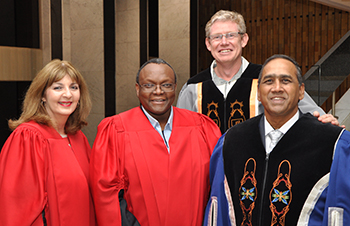Latest News Archive
Please select Category, Year, and then Month to display items
01 February 2024
|
Story Lacea Loader
|
Photo SUPPLIED
 Prof Prince Ngobeni, newly appointed Campus Principal of the UFS Qwaqwa Campus.
Prof Prince Ngobeni, newly appointed Campus Principal of the UFS Qwaqwa Campus.
The University of the Free State (UFS) has appointed Prof Prince Ngobeni as Principal of the Qwaqwa Campus as from 1 February 2024.
Prof Ngobeni completed his first qualification in Analytical Chemistry at the then Technikon North-West before furthering his studies at the then Technikon Pretoria. He completed a DTech in Chemistry at the Tshwane University of Technology (TUT) in 2003. In 2016, he enrolled for a Doctor of Business Administration in Higher Education at the University of Bath in England.
His lecturing career began at TUT in 1995 where he progressed from Head of Department: Chemistry in 2003 to Associate Dean: Faculty of Science in 2010, before being appointed as Executive Dean of the Faculty of Sciences at TUT in 2015 – a position he held until 2023. He also served as Interim Campus Rector of TUT’s Pretoria Campus from 2018 to 2020.
“With extensive years of academic leadership experience, Prof Ngobeni has the experience required to guide the Qwaqwa Campus towards the university’s Vision 130. The campus is already recognised as a leader in some of its unique research fields, and Prof Ngobeni’s strong research background will be valuable in this regard,” says Prof Francis Petersen, Vice-Chancellor and Principal of the UFS.
Prof Ngobeni is a member of several professional bodies in his field of expertise, including MatTEK at the Council for Scientific and Industrial Research (CSIR), the South African Chemical Institute (SACI), the Society for Atomic Spectroscopy, and the South African Council for Natural Scientific Professions (SACNASP). During his career, he has also secured research funding for individual projects and international partnerships. Prof Ngobeni also initiated chemistry practical sessions for local schools and participated in the Technology Station in Chemicals project, which offers a wide range of services designed to assist small and medium enterprises (SMEs) in the chemical sector.
His substantial list of publications in journals and books covers a range of chemistry-related and managerial topics. He is also a well-versed presenter at local and international conferences.
“The Qwaqwa Campus has experienced major developments in recent years; I look forward to further contributing to the growth of the campus and to support the university in achieving its Vision 130,” says Prof Ngobeni.
Prof Tim Murithi calls for Africa to design new global order
2016-06-02

From left: Prof Heidi Hudson, Head of Centre for Africa
Studies (CAS); Prof Tim Murithi, Extraordinary Professor
at CAS; Prof Lucius Botes, Dean of the Faculty of
the Humanities; and Prof Prakash Naidoo, Principal of
Qwaqwa Campus.
Photo: Stephen Collet
“What do Africans have to say about the remaking of the global order?” was the opening question of Prof Tim Murithi’s lecture which was hosted by the Centre for Africa Studies (CAS) of the University of the Free State (UFS) to celebrate Africa Day on 25 May 2016.
The annual Africa Day Memorial Lecture, entitled: Africa and the Remaking of the Global Order, doubled as Prof Murithi’s inaugural lecture. He is CAS’s newly-appointed Extraordinary Professor, as well as the Head of the Justice and Reconciliation in Africa Programme at the Institute for Justice and Reconciliation in Cape Town. He made a compelling argument for the need for Africa to exert an active influence on international narratives of peace, governance, justice, and reconciliation.
“If we are waiting for American leadership to get us out of the quagmire of a situation we are in, we will be waiting for a long time,” said Prof Murithi.
The Head of the Centre, Prof Heidi Hudson, concurred with Prof Murithi’s suggestion of devising African solutions for African problems. She quoted Audre Lorde’s well-known assertion that “The master’s tools will never dismantle the master’s house.”
Remembering 1963
Over five decades ago, on 25 May 1963, the Organisation of African Unity was formed, and was renamed the African Union in 2002. Africa Day marks this pivotal point in the continent’s history. On this day, we reflect on the continent’s journey into democracy, peace, stability and socio-economic development. It is also an opportunity to celebrate African identity and heritage.
Continent-building dialogues
The UFS Sasol Library celebrated Africa Day with a book launch. Facets of Power. Politics, Profits and People in the Making of Zimbabwe's Blood Diamonds by Tinashe Nyamunda is a reflection of some of the challenges that Zimbabwe continues to face. It details the disadvantaged position which the country finds itself in due to greed, maladministration, and corruption, despite possessing large deposits of minerals.
In celebration of Africa Month, CAS has held a series of lectures by esteemed scholars from across the globe. Earlier in the month, Prof Henning Melber presented lectures on Namibia’s independence and the African middle class. Kevin Bloom and Richard Poplak unpacked the issues surrounding Africa’s continental shift, while Prof Joleen Steyn Kotze focused on the possible fall of the African National Congress.